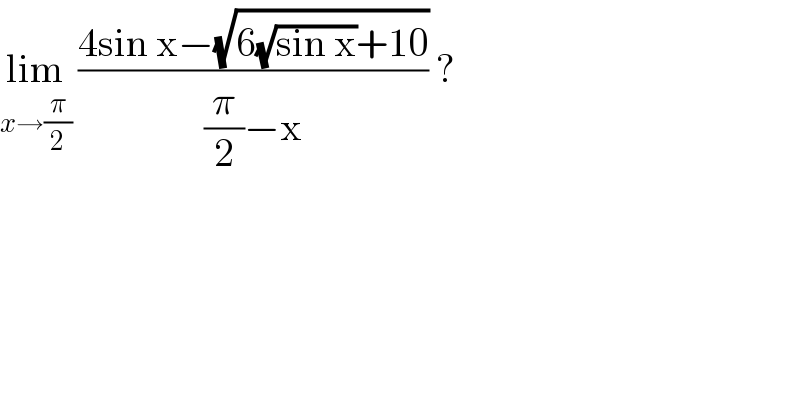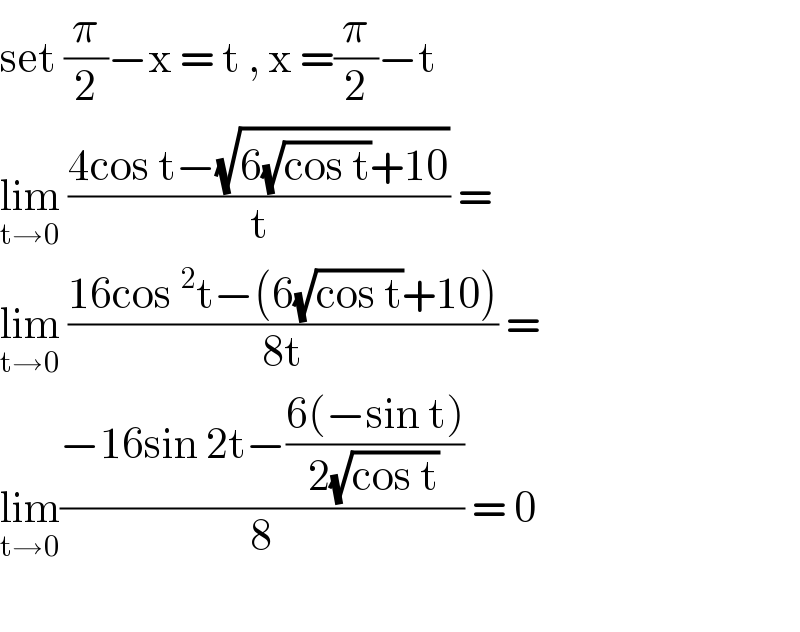
Question Number 100134 by bemath last updated on 25/Jun/20

$$\underset{{x}\rightarrow\frac{\pi}{\mathrm{2}}} {\mathrm{lim}}\:\frac{\mathrm{4sin}\:\mathrm{x}−\sqrt{\mathrm{6}\sqrt{\mathrm{sin}\:\mathrm{x}}+\mathrm{10}}}{\frac{\pi}{\mathrm{2}}−\mathrm{x}}\:? \\ $$
Commented by bobhans last updated on 25/Jun/20

$$\mathrm{set}\:\frac{\pi}{\mathrm{2}}−\mathrm{x}\:=\:\mathrm{t}\:,\:\mathrm{x}\:=\frac{\pi}{\mathrm{2}}−\mathrm{t}\: \\ $$$$\underset{\mathrm{t}\rightarrow\mathrm{0}} {\mathrm{lim}}\:\frac{\mathrm{4cos}\:\mathrm{t}−\sqrt{\mathrm{6}\sqrt{\mathrm{cos}\:\mathrm{t}}+\mathrm{10}}}{\mathrm{t}}\:= \\ $$$$\underset{\mathrm{t}\rightarrow\mathrm{0}} {\mathrm{lim}}\:\frac{\mathrm{16cos}\:^{\mathrm{2}} \mathrm{t}−\left(\mathrm{6}\sqrt{\mathrm{cos}\:\mathrm{t}}+\mathrm{10}\right)}{\mathrm{8t}}\:= \\ $$$$\underset{\mathrm{t}\rightarrow\mathrm{0}} {\mathrm{lim}}\frac{−\mathrm{16sin}\:\mathrm{2t}−\frac{\mathrm{6}\left(−\mathrm{sin}\:\mathrm{t}\right)}{\mathrm{2}\sqrt{\mathrm{cos}\:\mathrm{t}}}}{\mathrm{8}}\:=\:\mathrm{0} \\ $$$$ \\ $$
Commented by Dwaipayan Shikari last updated on 25/Jun/20

$$\underset{{x}\rightarrow\frac{\pi}{\mathrm{2}}} {\mathrm{lim}}\frac{−\mathrm{4cosx}−\frac{\frac{\mathrm{1}}{\mathrm{2}}.\frac{\mathrm{3}}{\sqrt{\mathrm{sinx}}}\mathrm{cosx}}{\sqrt{\mathrm{6}\sqrt{\mathrm{sinx}}+\mathrm{10}}}}{−\mathrm{1}}=\mathrm{0} \\ $$
Answered by mathmax by abdo last updated on 25/Jun/20

$$\mathrm{changement}\:\frac{\pi}{\mathrm{2}}−\mathrm{x}\:=\mathrm{t}\:\mathrm{give}\:\mathrm{f}\left(\mathrm{x}\right)=\frac{\mathrm{4sinx}−\sqrt{\mathrm{6}\sqrt{\mathrm{sinx}}+\mathrm{10}}}{\frac{\pi}{\mathrm{2}}−\mathrm{x}} \\ $$$$=\frac{\mathrm{4cost}\:−\sqrt{\mathrm{6}\sqrt{\mathrm{cost}}+\mathrm{10}}}{\mathrm{t}}=\mathrm{g}\left(\mathrm{t}\right)\:\:\mathrm{we}\:\mathrm{have}\:\mathrm{cost}\:\sim\mathrm{1}−\frac{\mathrm{t}^{\mathrm{2}} }{\mathrm{2}}\:\Rightarrow\sqrt{\mathrm{cost}}\sim\mathrm{1}−\frac{\mathrm{t}^{\mathrm{2}} }{\mathrm{4}}\:\Rightarrow \\ $$$$\mathrm{6}\sqrt{\mathrm{cost}}\sim\mathrm{6}−\frac{\mathrm{3}}{\mathrm{2}}\mathrm{t}^{\mathrm{2}} \:\:\Rightarrow\sqrt{\mathrm{6}\sqrt{\mathrm{cost}}+\mathrm{10}}\sim\sqrt{\mathrm{16}−\frac{\mathrm{3}}{\mathrm{2}}\mathrm{t}^{\mathrm{2}} }=\mathrm{4}\sqrt{\mathrm{1}−\frac{\mathrm{3t}^{\mathrm{2}} }{\mathrm{32}}}\sim\mathrm{4}\left(\mathrm{1}−\frac{\mathrm{3t}^{\mathrm{2}} }{\mathrm{64}}\right)\:\Rightarrow \\ $$$$\mathrm{g}\left(\mathrm{t}\right)\:\sim\frac{\mathrm{4}−\mathrm{2t}^{\mathrm{2}} −\mathrm{4}+\frac{\mathrm{3t}^{\mathrm{2}} }{\mathrm{16}}}{\mathrm{t}}\:=\left(−\mathrm{2}+\frac{\mathrm{3}}{\mathrm{16}}\right)\mathrm{t}\:\rightarrow\mathrm{0}\:\Rightarrow\mathrm{lim}_{\mathrm{x}\rightarrow\frac{\pi}{\mathrm{2}}} \:\:\mathrm{f}\left(\mathrm{x}\right)\:=\mathrm{0} \\ $$
